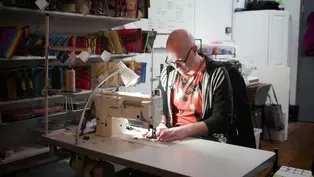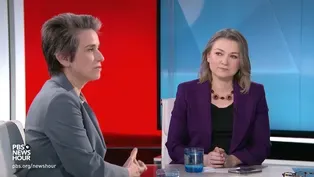
'Havana syndrome' investigator on linking Russia to attacks
Clip: 4/1/2024 | 6m 4sVideo has Closed Captions
'Havana syndrome' investigator on accusing Russia of targeting U.S. officials
For the last decade, American diplomatic, law enforcement and intelligence personnel have suffered grievous injuries in the line of duty. Many say they felt attacked by debilitating waves of sound and pressure known as "Havana syndrome." Sunday, 60 Minutes reported more on this story, and assigned blame to Russia. Geoff Bennett discussed that report with retired Army Lt. Col. Gregory Edgreen.
Problems with Closed Captions? Closed Captioning Feedback
Problems with Closed Captions? Closed Captioning Feedback
Major corporate funding for the PBS News Hour is provided by BDO, BNSF, Consumer Cellular, American Cruise Lines, and Raymond James. Funding for the PBS NewsHour Weekend is provided by...

'Havana syndrome' investigator on linking Russia to attacks
Clip: 4/1/2024 | 6m 4sVideo has Closed Captions
For the last decade, American diplomatic, law enforcement and intelligence personnel have suffered grievous injuries in the line of duty. Many say they felt attacked by debilitating waves of sound and pressure known as "Havana syndrome." Sunday, 60 Minutes reported more on this story, and assigned blame to Russia. Geoff Bennett discussed that report with retired Army Lt. Col. Gregory Edgreen.
Problems with Closed Captions? Closed Captioning Feedback
How to Watch PBS News Hour
PBS News Hour is available to stream on pbs.org and the free PBS App, available on iPhone, Apple TV, Android TV, Android smartphones, Amazon Fire TV, Amazon Fire Tablet, Roku, Samsung Smart TV, and Vizio.
Providing Support for PBS.org
Learn Moreabout PBS online sponsorshipGEOFF BENNETT: For the last decade, American diplomatic law enforcement and intelligence personnel have suffered grievous, often life-altering injuries in the line of duty.
No guns or bombs or rockets were involved.
Many say they felt attacked by sound.
That's debilitating waves of sound and pressure that have left them with traumatic brain injuries, vertigo and other physical ailments grouped under the government designation of anomalous health incidents.
You may know it by a different name, Havana Syndrome.
Last evening, CBS News' "60 Minutes" reported more on this story and assigned blame to a foreign adversary of the U.S., Russia.
For perspective, let's bring in Retired Army Lieutenant Colonel Gregory Edgreen.
He ran an investigation at the Defense Intelligence Agency about the sources of Havana Syndrome.
He's now the founder and CEO of Advanced Echelon.
That's an organization that takes care of Havana Syndrome survivors and their families and works to pursue those responsible for the attacks.
Thank you for being with us.
You have said that you are confident that Russia is behind these attacks.
What informs that confidence?
GREGORY EDGREEN, CEO and Founder, Advanced Echelon LLC: I just went off of a large body of open-source reporting.
You can go to The Insider.
They put out a great piece recently, along with Der Spiegel.
There's a lot of arrows pointing to Moscow right now.
And I suggest you guys talk to some of the survivors, because they will give you some very key insights into their backgrounds, what they were doing, things they were working on.
It all paints a very clear picture to the layperson about who could be responsible for this.
GEOFF BENNETT: You ran the military investigation into Havana Syndrome.
You told "60 Minutes" that the bar for proof was set impossibly high.
Tell me more about that.
What was the bar of proof and what was the motivation behind elevating it, in your view?
GREGORY EDGREEN: Yes, Geoff, so I can't get into specifics based on classification levels.
What I can tell you is that, from my perspective, things and requirements from higher levels of the government seemed to change quickly.
And you have to contact those officials still inside the government to figure out why they were changing certain requirements for the intelligence community.
But I can tell you that this problem is not going to get better with time.
We need to address it head on.
And, most importantly, we need to start taking care of the Havana Syndrome survivors and their families.
It's about time to take action.
And that time is now.
GEOFF BENNETT: As we mentioned, you retired from the Army to start a company that helps the Havana Syndrome survivors.
I imagine every case is different.
But, generally speaking, how are they faring, the folks that you work with?
GREGORY EDGREEN: They're not doing well.
They continue to see government products, such as the recent NIH reports, or intelligence community assessments that basically gaslight them and tell them that their problems don't exist.
But we have been here before.
This happened with the Moscow Signal for decades.
This has happened with PTSD.
This has also happened with Agent Orange.
We need to start taking care of people that signed up to protect America and America's values and their interests abroad, because, if we don't, America's eyes are going to be blinded and our ears deafened in every embassy across the globe.
GEOFF BENNETT: Our Nick Schifrin reached out to the Office of the Director of National Intelligence for a response in regards to this reporting by "60 Minutes."
And they directed reporters to previous remarks by director Avril Haines, part of which read this way: "Most I.C.," or intelligence community, "elements now have concluded that it is very unlikely that a foreign adversary is responsible for the reported AHIs, anomalous health incidents.
And there are different degrees of confidence associated with that.
At the same time, we are going to be and continue to be vigilant about looking for information that undercuts those assumptions."
What's your reaction to that statement?
GREGORY EDGREEN: I would ask whoever wrote that statement to watch the "60 Minutes" episode and to read The Insider's recent reporting on it.
It paints a very clear picture to most Americans.
And it also lists some clear evidence that's been uncovered with open-source reporting.
GEOFF BENNETT: Do you believe the federal government is covering this up?
GREGORY EDGREEN: I won't get into discussions of cover-ups and conspiracies.
But what I will say is that hundreds of families have been impacted, and this is also affecting our national security.
It needs to be addressed.
GEOFF BENNETT: So, one of the survivors who spoke to "60 Minutes," she's an FBI agent who was identified as Carrie.
She referred to this attack as being the result of next-generation weaponry.
And she said that she and the other survivors, she viewed them as being test subjects.
And yet, as I understand it, the federal government has not been able to pinpoint or replicate whatever this weapon is.
Can you help us understand more about that?
GREGORY EDGREEN: I believe what the survivor was referring to was a directed energy weapon.
And I imagine after this "60 Minutes" episode aired and recent Insider reporting, there's going to be an avalanche of FOIA requests to uncover what the government knows and research that has done on this, what countries are using these technologies.
But one might just go to Google and search for directed energy weapons in Russian and see what comes up.
You can -- there's plenty of examples of President Putin pinning on of medals and various awards to Russian scientists in the field of directed energy weapons.
Look at the comments that he made in September about fielding more directed energy weapons.
And also look at the national security adviser in Moscow, what he said in the Rozniki (ph) article in September of 2023 about how Moscow has successfully removed hundreds of U.S. intelligence officers from the field in the past decade.
I'd like to know more about that.
GEOFF BENNETT: That is retired Army Lieutenant Colonel Gregory Edgreen.
Thanks for your insights, and thanks for your time this evening.
GREGORY EDGREEN: Thank you, Geoff.
Take care.
Artist fuses design, accessory to create art you can carry
Video has Closed Captions
Clip: 4/1/2024 | 5m 21s | Rhode Island artist fuses design and accessory to create art you can carry (5m 21s)
Attack on Iran consulate in Syria escalates Mideast conflict
Video has Closed Captions
Clip: 4/1/2024 | 3m 32s | Attack on Iran consulate in Syria escalates conflict in Middle East (3m 32s)
The challenging task crews face to clear collapsed bridge
Video has Closed Captions
Clip: 4/1/2024 | 4m 56s | The challenging task crews face to clear collapsed bridge and reopen Baltimore's port (4m 56s)
Gov. Whitmer on efforts to protect reproductive rights
Video has Closed Captions
Clip: 4/1/2024 | 7m 40s | Gov. Whitmer discusses Democrats' efforts to protect reproductive rights (7m 40s)
State laws create disparities in access to food benefits
Video has Closed Captions
Clip: 4/1/2024 | 9m 17s | State laws create disparities in access to government food benefits (9m 17s)
Tamara Keith and Amy Walter on abortion motivating voters
Video has Closed Captions
Clip: 4/1/2024 | 9m 20s | Tamara Keith and Amy Walter on how abortion rights could motivate voter turnout for Biden (9m 20s)
Providing Support for PBS.org
Learn Moreabout PBS online sponsorshipSupport for PBS provided by:
Major corporate funding for the PBS News Hour is provided by BDO, BNSF, Consumer Cellular, American Cruise Lines, and Raymond James. Funding for the PBS NewsHour Weekend is provided by...

















